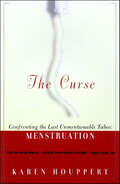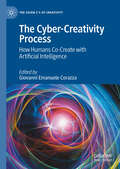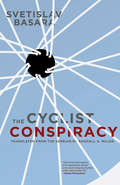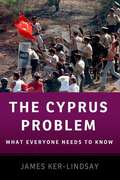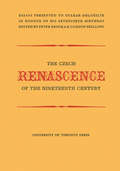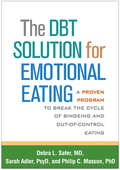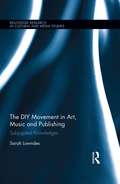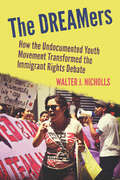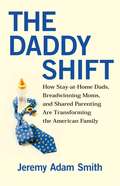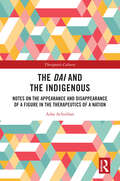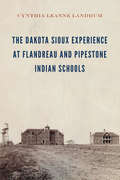- Table View
- List View
The Curse of the Pharaohs: My Adventures With Mummies
by Zahi HawassMany people still believe that, should someone disturb the resting place of the ancient Egyptians, they will be struck down with the 'curse of the mummies'. This book explores the myths and legends that surround the curse, as well as describing the archaeological excavations that contributed to our understanding.
The Curse: Confronting the Last Unmentionable Taboo: Menstruation
by Karen HouppertA provocative look at the way our culture deals with menstruation.The Curse examines the culture of concealment that surrounds menstruation and the devastating impact such secrecy has on women's physical and psychological health. Karen Houppert combines reporting on the potential safety problems of sanitary products--such as dioxin-laced tampons--with an analysis of the way ads, movies, young-adult novels, and women's magazines foster a "menstrual etiquette" that leaves women more likely to tell their male colleagues about an affair than brazenly carry an unopened tampon down the hall to the bathroom. From the very beginning, industry-generated instructional films sketch out the parameters of acceptable behavior and teach young girls that bleeding is naughty, irrepressible evidence of sexuality. In the process, confident girls learn to be self-conscious teens. And the secrecy has even broader implications. Houppert argues that industry ad campaigns have effectively stymied consumer debate, research, and safety monitoring of the sanitary-protection industry. By telling girls and women how to think and talk about menstruation, the mostly male-dominated media have set a tone that shapes women's experiences for them, defining what they are allowed to feel about their periods, their bodies, and their sexuality.
The Custer Fight; Capt. Benteen’s Story Of The Battle
by E. A. Brininstool Captain Frederick W. BenteenFOR THE FIRST TIME since he testified before the Reno Court of Inquiry, at Chicago, in 1879, Capt. F. W. Benteen, senior captain of Custer's regiment, the famous 7th Cavalry, here relates the part he played in that most disastrous of Indian fights on American soil, over which more controversy has raged than over any other battle fought against the red man in the United States.Much of the account is from his own testimony at the Reno Inquiry; some of it is from the personal letters of Capt. Benteen, (in possession of the author). Certain charges were made against Major Marcus A. Reno and Capt. Benteen by Frederick Whittaker, Custer's biographer. At the last moment Whittaker withdrew his charges against Capt. Benteen. He also utterly failed to substantiate his charges against Major Reno, the verdict of the Court being that "there was nothing in his conduct which requires animadversion from the Court, and that in view of all the facts in evidence, no further proceedings are necessary in this case."No officer in the Civil War won a more brilliant record than Major Reno, he being brevetted by grades from a first lieutenant to a colonel ''for gallant and meritorious service." Later, he served as Assistant Instructor of Infantry Tactics at the U. S. Military Academy at West Point.The testimony at the Reno Inquiry revealed that both Capt. Benteen and Major Reno had done the best that could be done with what they had to do with, and that, but for their extraordinary heroism and bravery in the fight on the bluffs, following Custer's overwhelming defeat, four miles down the river, the troops under their charge would likewise have been wiped out.Students of the battle of the Little Big Horn will do well to carefully preserve this account of the Custer fight as related by Capt. Benteen.
The Custody Evaluation Handbook: Research Based Solutions & Applications
by Barry BricklinFirst published in 1996. Routledge is an imprint of Taylor & Francis, an informa company.
The Cyber Effect: A Pioneering Cyberpsychologist Explains How Human Behavior Changes Online (Not A Ser.)
by Mary AikenA groundbreaking exploration of how cyberspace is changing the way we think, feel, and behave Mary Aiken is the world's leading expert in forensic cyberpsychology--a discipline that combines psychology, criminology, and technology to investigate the intersection where technology and human behavior meet. In this, her first book, Aiken has created a starting point for all future conversations about how the Internet is shaping development and behavior, societal norms and values, children, safety, security, and our perception of the world. Cyberspace is an environment full of surveillance, but who is looking out for us? The Cyber Effect offers a fascinating and chilling look at a future we can still do something about. Drawing on her own research and extensive experience with law enforcement, Mary Aiken covers a wide range of subjects from the impact of screens on the developing child to the explosion of teen sexting, and the acceleration of compulsive and addictive behaviors online (gaming, shopping, pornography). She examines the escalation of cyberchondria (anxiety produced by self-diagnosing online), cyberstalking, and organized cybercrime in the Deep Web. Aiken provides surprising statistics and incredible-but-true case studies of hidden trends that are shaping our culture and raising troubling questions about where the digital revolution is taking us. The Cyber Effect will upend your assumptions about your online life and forever change the way you think about the technology you, your friends, and family use. Readers will gain a new understanding of the rapid change taking shape around us and come away with critical tools to become part of this very necessary conversation.Advance praise for The Cyber Effect"Just as Rachel Carson launched the modern environmental movement with her Silent Spring, Mary Aiken delivers a deeply disturbing, utterly penetrating, and urgently timed investigation into the perils of the largest unregulated social experiment of our time."--Bob Woodward "Mary Aiken takes us on a fascinating, thought-provoking, and at times scary journey down the rabbit hole to witness how the Internet is changing the human psyche. A must-read for anyone who wants to understand the temptations and tragedies of cyberspace."--John R. Suler, PhD, author of The Psychology of Cyberspace"Drawing on a fascinating and mind-boggling range of research and knowledge, Mary Aiken has written a great, important book that terrifies then consoles by pointing a way forward so that our experience online might not outstrip our common sense. A must-read for this moment in time."--Steven D. Levitt, co-author of the New York Times bestseller Freakonomics"Figuring out how to guide kids in a hyperconnected world is one of the biggest challenges for today's parents. Mary Aiken clearly and calmly separates reality from myth. She clearly lays out the issues we really need to be concerned about and calmly instructs us on how to keep our kids safe and healthy in their digital lives."--Peggy Orenstein, author of the New York Times bestseller Girls & Sex "Having worked with law enforcement groups from INTERPOL and Europol as well as the U.S. government, Aiken knows firsthand how today's digital tools can be exploited by criminals lurking in the Internet's Dark Net."--NewsweekFrom the Hardcover edition.
The Cyber-Creativity Process: How Humans Co-Create with Artificial Intelligence (The Seven C’s of Creativity)
by Giovanni Emanuele CorazzaThis edited book explores the process of creating using the seven C's of creativity framework. It discusses the creative process as a collaboration between humans and Artificial Intelligence (AI), here identified as the cyber-creativity process. Through nine chapters written by leading scholars in the field, this collection delves into the rapidly emerging area of Generative-AI (Gen-AI) applications and sheds light on the parts of the creative process that will remain fundamentally human throughout the foreseeable future, as well as those that will benefit more from AI-augmentation. Drawing on the dynamic definition of creativity, the contents encompass the Dynamic Universal Creative Process (DUCP) and the DA VINCI model, the design principles of Gen-AI algorithms, the cyber-creativity process in education, journalism, design, fashion, music, and its implications on intellectual property protection. A timely reflection on the complex and evolving relation between creativity and technology, this volume will interest academics, researchers, and students alike across humanities, social and hard sciences.
The Cybergypsies
by Indra SinhaTHE CYBERGYPSIES describes one man's exploration of cyberspace over many years and the folk he meets on the Net, the cybergypsies: virus writers, hackers, witches, sex-peddlars, conmen, net vamps, randy paratroopers posing as girls; the A-bomb blueprints he was offered for sale. He recounts with startling honesty how he nearly lost everything because of his obsession with the Net and how the Net can be as dangerous and destructive as any drug addiction. However, the author also shows how the Internet can be used for positive aims, as he describes how he fought for human rights with desperate appeals for the Kurdish refugees in the wake of the Gulf War and justice for Bhopal's gas victims in campaigns involving Jeffrey Archer and Don McCullin.
The Cyberspace Handbook
by Jason WhittakerThe Cyberspace Handbook is a comprehensive guide to all aspects of new media, information technologies and the internet. It gives an overview of the economic, political, social and cultural contexts of cyberspace, and provides practical advice on using new technologies for research, communication and publication. The Cyberspace Handbook includes: *a glossary of over eighty key terms*a list of over ninety web resources for news and entertainment, new media and web development, education and reference, and internet and web information* specialist chapters on web design and journalism and writing on the web*Over thirty illustrations of internet material and software applications.Jason Whittaker explores how cyberspace has been constructed, how it is used and extends into areas as different as providing us immediate news or immersive games and virtual technologies for areas such as copyright and cybercrime, as well as key skills in employing the internet for research or writing and designing for the Web.
The Cycladic and Aegean Islands in Prehistory
by Ina BergThis textbook offers an up-to-date academic synthesis of the Aegean islands from the earliest Palaeolithic period through to the demise of the Mycenaean civilization in the Late Bronze III period. The book integrates new findings and theoretical approaches whilst, at the same time, allowing readers to contextualize their understanding through engagement with bigger overarching issues and themes, often drawing explicitly on key theoretical concepts and debates. Structured according to chronological periods and with two dedicated chapters on Akrotiri and the debate around the volcanic eruption of Thera, this book is an essential companion for all those interested in the prehistory of the Cyclades and other Aegean islands.
The Cycle: Confronting the Pain of Periods and PMDD
by Shalene GuptaA groundbreaking exploration of a debilitating disorder that’s underdiagnosed and misunderstood.Most days, Shalene Gupta was the person she’d always aspired to be. She was hardworking, excelled at work, and had a long-term boyfriend who she desperately loved.Then, every month like clockwork, it all came crashing down in fits of rage and inconsolable sorrow. Work became meaningless, and she struggled to get through the day. The lows were subterranean.After years of struggling to get an answer from doctors, Shalene learned she was one of millions who live with premenstrual dysphoric disorder (PMDD), a severe form of PMS. The physical and mental effects of this disorder are undeniable, but for decades some doctors didn’t even consider PMDD a real condition. How could so many people be suffering at the hands of a chronic condition that doesn’t even exist?The Cycle uncovers a hidden epidemic, delivering the definitive portrait of a widespread chronic illness most people haven’t even heard of. From a historical overview of feminist debates, to on-the-ground interviews and a searing critique of menstrual stigma, Shalene Gupta lays out how disregard for this disorder has left too many people scrambling for appropriate healthcare. Deeply researched, movingly intimate, and refreshingly hopeful, this book is essential reading for any curious reader, especially those navigating a world ill-equipped to support their health.
The Cyclist Conspiracy
by Randall A. Major Svetislav BasaraTold through a series of "historical documents"--memoirs, illustrations, letters, philosophical treatises, blue prints, maps--the novel details the tale of a secret Brotherhood who meet in dreams, gain esoteric knowledge from contemplation of the bicycle, and seek to move in and out of history, manipulating events.
The Cypress and Other Writings of a German Pioneer in Texas
by Hermann Seele translated by Edward C. BreitenkampWhen Hermann Seele anived in New Braunfels in 1845, the raw colony was plagued by poverty, disease, lack of food, and hostile Indians. This personal record of the Germans in Texas shows their evolution from struggling colonists to prosperous citizens. From his viewpoint of a hardworking yet imaginative pioneer, Seele presents first a history of German immigration and settlement in Texas during the nineteenth century. Next, his autobiographical writings range from a "sentimental recollection" of his first Christmas Eve in Texas to his first day of teaching in New Braunfels, from accounts of the popular singing society to murder and justice along the Comal River. In addition, Seele's romantic novel, The Cypress, is a delightful though improbable tale of a traveling botanist, a chieftain's daughter, and a savage Indian cult. Hermann Seele--farmer, lawyer, teacher, lay preacher, mayor, state representative, Civil War major, and editor--epitomizes the best of the German immigrants who established their communities as models of respectability and prosperity. When Hermann Seele anived in New Braunfels in 1845, the raw colony was plagued by poverty, disease, lack of food, and hostile Indians. This personal record of the Germans in Texas shows their evolution from struggling colonists to prosperous citizens. From his viewpoint of a hardworking yet imaginative pioneer, Seele presents first a history of German immigration and settlement in Texas during the nineteenth century. Next, his autobiographical writings range from a "sentimental recollection" of his first Christmas Eve in Texas to his first day of teaching in New Braunfels, from accounts of the popular singing society to murder and justice along the Comal River. In addition, Seele's romantic novel, The Cypress, is a delightful though improbable tale of a traveling botanist, a chieftain's daughter, and a savage Indian cult. Hermann Seele--farmer, lawyer, teacher, lay preacher, mayor, state representative, Civil War major, and editor--epitomizes the best of the German immigrants who established their communities as models of respectability and prosperity.
The Cyprus Problem: What Everyone Needs To Know
by James Ker-LindsayIn The Cyprus Problem: What Everyone Needs to Know®, James Ker-Lindsay--recently appointed as expert advisor to the UN Secretary-General's Special Advisor on Cyprus--offers an incisive, even-handed account of the conflict. Ker-Lindsay covers all aspects of the Cyprus problem, placing it in historical context, addressing the situation as it now stands, and looking toward its possible resolution. The book begins with the origins of the Greek and Turkish Cypriot communities as well as the other indigenous communities on the island (Maronites, Latin, Armenians, and Gypsies). Ker-Lindsay then examines the tensions that emerged between the Greek and Turkish Cypriots after independence in 1960 and the complex constitutional provisions and international treaties designed to safeguard the new state. He pays special attention to the Turkish invasion in 1974 and the subsequent efforts by the UN and the international community to reunite Cyprus. The book's final two chapters address a host of pressing issues that divide the two Cypriot communities, including key concerns over property, refugee returns, and the repatriation of settlers. Ker-Lindsay concludes by considering whether partition really is the best solution, as many observers increasingly suggest. <p><p> Written by a leading expert, The Cyprus Problem brings much needed clarity and understanding to a conflict that has confounded observers and participants alike for decades.
The Czech Renascence of the Nineteenth Century
by Peter Brock H. Gordon SkillingLiterature and historical writing among the Czechs, as among many other nations lacking a political state, played a vital role in promoting national consciousness. This volume, written to honour the seventieth birthday of the eminent Czech historian Otakar Odložík, contains essays by outstanding scholars from Canada, Czechoslovakia, Britain, and the United States which examine significant episodes in the development of modern Czech nationalism from its origins in the late eighteenth century to the birth of an independent nation after the First World War. The main emphasis is on the middle decades of the nineteenth century, which were crucial for mapping the direction Czech nationalism was to take during the subsequent hundred years. The stand of the Czech and Slovak peoples in the crisis of August 1968 reflected the deep roots of their patriotism which developed during the nineteenth-century national renascence. This volume contains essays on Dobrovský, the pioneer of Czech language studies, and on Palacký, the author of the first great national history, as well as on other facets of literary history which have influenced national feeling. A Prague scholar investigates the social structure of the early Czech patriotic intelligentsia and reaches conclusions which considerably modify hitherto existing views. Two contributions examine the role of the press in the emergence of Czech nationalism; the Matice Ceskà, a leading patriotic literary foundation, is the subject of one of the studies. Slovak and Lusatian Serb, German, and American reaction to the Czech national renascence is examined in a series of chapters. The political expression of Czech nationalism, first during the Year of Revolutions, 1848, and then from the late 1870s until the early years of the twentieth century, is subjected to analysis in several studies. Finally, there is a brief review of the problems associated with the Czech-Slovak background of Tomáš Masaryk, the creator of modern Czechoslovakia. A fitting tribute to an outstanding scholar, this volume makes an important contribution to the literature in English on nineteenth-century Czech lands.
The DBQ Project Mini-Q's in Civics
by Laurel SingletonLearn more about being an American citizen by studying the culture, history and government of the US.
The DBT Solution for Emotional Eating: A Proven Program to Break the Cycle of Bingeing and Out-of-Control Eating
by Debra L. Safer Sarah Adler Philip C. MassonEating can be a source of great pleasure--or deep distress. If you've picked up this book, chances are you're looking for tools to transform your relationship with food. Grounded in dialectical behavior therapy (DBT), this motivating guide offers a powerful pathway to change. Drs. Debra L. Safer, Sarah Adler, and Philip C. Masson have translated their proven, state-of-the-art treatment into a compassionate self-help resource for anyone struggling with bingeing and other types of "stress eating." You will learn to: *Identify your emotional triggers. *Cope with painful or uncomfortable feelings in new and healthier ways. *Gain awareness of urges and cravings without acting on them. *Break free from self-judgment and other traps. *Practice specially tailored mindfulness techniques. *Make meaningful behavior changes, one doable step at a time. Vivid examples and stories help you build each DBT skill. Carefully crafted practical tools (you can download and print additional copies as needed) let you track your progress and fit the program to your own needs. Finally, freedom from out-of-control eating--and a happier future--are in sight. Mental health professionals, see also the related treatment manual, Dialectical Behavior Therapy for Binge Eating and Bulimia, by Debra L. Safer, Christy F. Telch, and Eunice Y. Chen.
The DIY Movement in Art, Music and Publishing: Subjugated Knowledges (Routledge Research in Cultural and Media Studies)
by Sarah LowndesThis book considers the history of Do It Yourself art, music and publishing, demonstrating how DIY strategies have transitioned from being marginal, to emergent, to embedded. Through secondary research, observation and 30 original interviews, each chapter analyses one of 15 creative cities (San Francisco, Los Angeles, Dusseldorf, New York, London, Manchester, Cologne, Washington DC, Detroit, Berlin, Glasgow, Olympia (Washington), Portland (Oregon), Moscow and Istanbul) and assesses the contemporary situation in each in the post-subcultural era of digital and internet technologies. The book challenges existing subcultural histories by examining less well-known scenes as well as exploring DIY "best practices" to trace a template of best approaches for sustainable, independent, locally owned creative enterprises.
The DOJ Investigation of the Chicago Police Department: The Complete Report by The United States Department of Justice
by Department of Justice Curtis Black“Perhaps the most damning, sweeping critique ever of the Chicago Police Department.” —Chicago Tribune Chicago, 2016. In a time of civil unrest in America, when racism, brutality, and division have taken prominent places in the daily news, the federal government conducted an investigation into the affairs of the Chicago Police Department. It is only one of many instances where the federal government has issued investigations of law enforcement across the nation before President Obama’s term expired. In a searing report, the department of justice examines Chicago’s law enforcement officers and officials for period of nearly thirteen months, digging to uncover moral and legal infractions committed within the department. Revealed is a pattern of aggression, lack of training, excessive use of force, racism and racial profiling, among other misconduct. Read the report in its entirety here. This edition is sure to provide readers with eye-opening insight into an epidemic of injustice and oppression across a divided nation.
The DREAMers: How the Undocumented Youth Movement Transformed the Immigrant Rights Debate
by Walter J. NichollsOn May 17, 2010, four undocumented students occupied the Arizona office of Senator John McCain. Across the country a flurry of occupations, hunger strikes, demonstrations, and marches followed, calling for support of the DREAM Act that would allow these young people the legal right to stay in the United States. The highly public, confrontational nature of these actions marked a sharp departure from more subdued, anonymous forms of activism of years past. The DREAMers provides the first investigation of the youth movement that has transformed the national immigration debate, from its start in the early 2000s through the present day. Walter Nicholls draws on interviews, news stories, and firsthand encounters with activists to highlight the strategies and claims that have created this now-powerful voice in American politics. Facing high levels of anti-immigrant sentiment across the country, undocumented youths sought to increase support for their cause and change the terms of debate by arguing for their unique position-as culturally integrated, long term residents and most importantly as "American" youth sharing in core American values. Since 2010 undocumented activists have increasingly claimed their own space in the public sphere, asserting a right to recognition-a right to have rights. Ultimately, through the story of the undocumented youth movement, The DREAMers shows how a stigmatized group-whether immigrants or others-can gain a powerful voice in American political debate.
The DREAMers: How the Undocumented Youth Movement Transformed the Immigrant Rights Debate
by Walter J. NichollsOn May 17, 2010, four undocumented students occupied the Arizona office of Senator John McCain. Across the country a flurry of occupations, hunger strikes, demonstrations, and marches followed, calling for support of the DREAM Act that would allow these young people the legal right to stay in the United States. The highly public, confrontational nature of these actions marked a sharp departure from more subdued, anonymous forms of activism of years past. The DREAMers provides the first investigation of the youth movement that has transformed the national immigration debate, from its start in the early 2000s through the present day. Walter Nicholls draws on interviews, news stories, and firsthand encounters with activists to highlight the strategies and claims that have created this now-powerful voice in American politics. Facing high levels of anti-immigrant sentiment across the country, undocumented youths sought to increase support for their cause and change the terms of debate by arguing for their unique position-as culturally integrated, long term residents and most importantly as "American" youth sharing in core American values. Since 2010 undocumented activists have increasingly claimed their own space in the public sphere, asserting a right to recognition-a right to have rights. Ultimately, through the story of the undocumented youth movement, The DREAMers shows how a stigmatized group-whether immigrants or others-can gain a powerful voice in American political debate.
The Daddy Shift: How Stay-at-Home Dads, Breadwinning Moms, and Shared Parenting Are Transforming the American Family
by Jeremy A. SmithThe first nuanced look at the meaning-for men and for American society-of stay-at-home fatherhood The Daddy Shiftis an accessible, personal, and deeply researched book about a growing phenomenon among American families: fathers who stay at home from work and take a larger role in raising children. What happens when dads stay home? And what does it mean for the larger society?In chapters that alternate between large-scale analysis and beautifully written close-up portraits of men and their partners, Smith traces the complications, myths, psychology, sociology, and history of a new set of social relationships. He explores the hopes and ideals that inform men's choices, and analyzes the economic and social developments that have made their choices possible. Filled with stories as well as entertaining history and research, Smith's book is a guide for thoughtful readers to a terrain more and more families are exploring.
The Dai and the Indigenous: Notes on the Appearance and Disappearance of a Figure in the Therapeutics of a Nation (ISSN)
by Asha AchuthanThis is a book about the dai, or traditional birth practitioner, and her place in the emerging therapeutic domain in colonial and contemporary India. The book employs a caste-informed feminist reading of the colonial archive against the grain and explores papers by Englishwomen physicians, texts of indigenous medicine and practitioner accounts, administrative documents, public commentaries, and legislative assembly debates from the 19th and early 20th centuries. It also examines contemporary healthcare policy discourse. Using these methodologies, the author traces the production of the dai as an unsanitary, unskilled indigenous figure in colonial and nationalist accounts. The book goes on to examine the workings of gender and caste in the setting up of this figure, at first for containment and then for removal from institutionalized healthcare – an exercise that is more or less completed in the present. The author argues that this exercise is part of the refashioning of the indigenous, and of indigenous medicine, throughout this period, into a highly codified domain that centres caste privilege and is supported by global capital networks. In such a refashioning, the dai figure is rendered remote not only from the centre of the healthcare apparatus but also from the centre of the contemporary nation. This genealogical tracing of indigenous medicine in Indian contexts, rather than separate histories, is also useful to understand better what is termed the healthcare assemblage today, and this book provides a ground on which this can be done.
The Dakota Sioux Experience at Flandreau and Pipestone Indian Schools
by Cynthia Leanne LandrumThe Dakota Sioux Experience at Flandreau and Pipestone Indian Schools illuminates the relationship between the Dakota Sioux community and the schools and surrounding region, as well as the community’s long-term effort to maintain its role as caretaker of the “sacred citadel” of its people. Cynthia Leanne Landrum explores how Dakota Sioux students at Flandreau Indian School in South Dakota and at Pipestone Indian School in Minnesota generally accepted the idea that they should attend these particular boarding institutions because they saw them as a means to an end and ultimately as community schools. This construct operated within the same philosophical framework in which some Eastern Woodland nations approached a non-Indian education that was simultaneously tied to long-term international alliances between Europeans and First Peoples beginning in the seventeenth and eighteenth centuries. Landrum provides a new perspective from which to consider the Dakota people’s overt acceptance of this non-Native education system and a window into their ongoing evolutionary relationships, with all of the historic overtures and tensions that began the moment alliances were first brokered between the Algonquian Confederations and the European powers.
The Dakota Way of Life (Studies in the Anthropology of North American Indians)
by Ella Cara DeloriaElla Cara Deloria devoted much of her life to the study of the language and culture of the Sioux (Dakota and Lakota). The Dakota Way of Life is the result of the long history of her ethnographic descriptions of traditional Dakota culture and social life. Deloria was the most prolific Native scholar of the greater Sioux Nation, and the results of her work comprise an essential source for the study of the greater Sioux Nation culture and language. For years she collected material for a study that would document the variations from group to group. Tragically, her manuscript was not published during her lifetime, and at the end of her life all of her major works remained unpublished. Deloria was a perfectionist who worked slowly and cautiously, attempting to be as objective as possible and revising multiple times. As a result, her work is invaluable. Her detailed cultural descriptions were intended less for purposes of cultural preservation than for practical application. Deloria was a scholar through and through, and yet she never let her dedication to scholarship overwhelm her sense of responsibility as a Dakota woman, with family concerns taking precedence over work. Her constant goal was to be an interpreter of an American Indian reality to others. Her studies of the Sioux are a monument to her talent and industry.
The Dam Builders: Power from the Glens
by James Mark MillerThis history of Scottish hydropower vividly chronicles the mid-20th century public works projects that transformed the Highlands. In the thirty years after the Second World War, the construction projects of the North of Scotland Hydro-Electric Board changed the face of the Highlands. They brought electricity to nearly every region north of the Highland Line. Founded by Scotland&’s idealistic Secretary of State Tom Johnston, these epic projects of hard labor in beautiful landscapes gave hope to Highland communities. By the time the last scheme was opened in Foyers in 1975, the engineers had built some fifty major dams and power stations, almost 200 miles of tunnel, 400 miles of road, and over 20,000 miles of power line. The Board had to overcome adverse weather and difficult terrain, as well as political opposition. The Dam Builders is a vivid account of these historic projects and includes eyewitness stories from many of the workers who made the electrification of the Highlands a reality.

